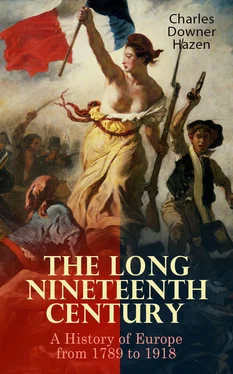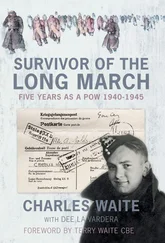The Constitution of 1793 established universal suffrage. It also carried decentralization farther than did the Constitution of 1791, which had carried it much too far. The Legislature was to be elected only for a year, and all laws were to be submitted to the people for ratification or rejection before being put into force. This is the first appearance of the referendum. The executive was to consist of twenty-four members chosen by the legislature out of a list drawn up by the electors and consisting of one person from each department.
This constitution worked like a charm in dissipating the distrust of the departments. Their rights could not be better safeguarded. Submitted to the voters the constitution was overwhelmingly ratified, over 1,000,000 votes in its favor, less than 12,000 in opposition. But this is the only way in which this constitution ever worked. So thoroughly did it decentralize the state, so weak did it leave the central government, that even those who had accepted it cordially saw that it could not be applied immediately, with foreign armies streaming into France from every direction. What was needed for the crisis, as every one saw, was a strong government. Consequently by general agreement the constitution was immediately suspended, as soon as it was made. The suspension was to be merely provisional. As soon as the crisis should pass it should be put into operation. Meanwhile this precious document was put into a box in the center of the convention hall and was much in the way.
To meet the crisis, to enable France to hew her way through the tangle of complexities and dangers that confronted her, a provisional government was created, a government as strong as the one provided by the constitution was weak, as efficient as that would have proved inefficient. The new system was frankly based on force, and it inaugurated a Reign of Terror which has remained a hissing and a by-word among the nations ever since. This provisional or revolutionary government was lodged in the Convention. The Convention was the sole nerve center whence shot forth to the farthest confines of the land the iron resolutions that beat down all opposition and fired all energies to a single end. The Convention was dictator, and it organized a government that was more absolute, more tyrannical, more centralized government than the Bourbon monarchy, in its palmiest days, had dreamed of being. Montesquieu's sacred doctrine of the separation of powers, which the Constituent Assembly had found so excellent, was ignored.
The machinery of this provisional government consisted of two important committees, appointed by the Convention, the Committee of Public Safety and the Committee of General Security; also of representatives on mission, of the Revolutionary Tribunal, and of the political clubs and committees of surveillance in the cities and villages throughout the country.
The Committee of Public Safety consisted at first of nine, later of twelve members. Chosen by the Convention for a term of a month, they were, as a matter of fact, re-elected month after month, changes only occurring when parties changed in the Assembly. Thus Danton, upon whose suggestion the original Public committee had been created, was not a member of the enlarged committee, reorganized after the expulsion of the Girondists. He was dropped because he censured the acts of June 2, and his enemy Robespierre became the leading member. At first this committee was charged simply with the management of foreign affairs and of the army, but in the end it became practically omnipotent, directing the state as no single despot had ever done, intervening in every department of the nation's affairs, even holding the Convention itself, of which in theory it was the creature, in stern and terrified subjection to itself. Installing itself in the palace of the Tuileries, in the former royal apartments, it developed a prodigious activity, framing endless decrees, tossing thousands of men to the guillotine, sending thousands upon thousands against the enemies of France, guiding, animating, tyrannizing ruthlessly a people which had taken such pains to declare itself free, only to find its fragile liberties, so resoundingly affirmed in the famous Declaration, ground to powder beneath this iron heel. No men ever worked harder in discharging an enormous mass of business of every kind than did the members of the Committee of Public Safety. Hour after hour, around a green table, they listened to reports, framed decrees, appointed officials. Sometimes overcome with weariness they threw themselves on mattresses spread upon the floor of their committee room, snatched two or three hours of sleep, then roused themselves to the racking work again. Under them was the Committee of General Security whose business was really police duty, maintaining order throughout the country, throwing multitudes of suspected persons into prison, whence they emerged only to encounter another redoubtable organ of this government, the Revolutionary Tribunal.
This Tribunal had been created at Danton's suggestion. It was an extraordinary criminal court, instituted for the purpose of trying traitors and conspirators rapidly. No appeal could be taken from its decisions. Its sentences were always sentences of death. Later, when Robespierre dominated the Committee of Public Safety, the number of judges was increased and they were divided into four sections, all holding sessions at the same time. Appointed by the Committee, the Revolutionary Tribunal servilely carried out its orders. It acted with a rapidity that made a cruel farce of justice. A man might be informed at ten o'clock that he was to appear before the Revolutionary Tribunal at eleven. By two o'clock he was sentenced, by four he was executed.
The Committee of Public Safety had another organ - the representatives on mission. These were members of the Convention sent, to each department, and two to each army, to see that the will of the Convention was carried out. Their powers were practically unlimited. They could not themselves pronounce the sentence of death but a word from them was sufficient to send to the Revolutionary Tribunal any one who incurred their suspicion or displeasure.
There were other parts of this governmental machinery, wheels within wheels, revolutionary clubs, affiliated with the Jacobin Club in Paris, revolutionary committees of surveillance. Through them the will of the great Committee of Public Safety penetrated to the tiniest hamlet, to the remotest corner of the land. The Republic was held tight in this closely-woven mesh.
This machinery was created to meet a national need, of the most pressing character. The country was in danger, in direst danger, of submersion under a flood of invasion; also in danger of disruption from within. The authors of this system were originally men who appreciated the critical situation, who grasped facts as they were, who were resolute to put down every foreign and domestic enemy, and who thrilled the people with their appeals to boundless, self-sacrificing patriotism. Had this machinery been used in the way and for the purpose intended, it is not likely that it would have enjoyed the dismal, repellent reputation with posterity which it has enjoyed. France would have willingly endured and sanctioned a direct and strong government, ruthlessly subordinating personal happiness and even personal security to the needs of national welfare. No cause could be higher, and none makes a wider or surer appeal to men. But the system was not restricted to this end. It was applied to satisfy personal and party intrigues and rancors, it was used to further the ambitions of individuals, it was crassly distorted and debased. The system did not spring full blown from the mind of any man or any group. It grew piece by piece, now this item being added, now that. Those who fashioned it believed that only by appealing to or arousing one of the emotions of men, fear, could the government get their complete and energetic support. The success of the Revolution could not be assured simply by love or admiration of its principles and its deeds - that was proved by events, the difficulties had only increased. There were too many persons who hated the Revolution. But even these had an emotion that could be touched, the sense of fear, horror, dread. That, too, is a powerful incentive to action. "Let terror be the order of the day," such was the official philosophy of the creators of this government, and it has given their system its name. Punish disloyalty swiftly and pitilessly and you create loyalty, if not from love, at least from fear, which will prove a passable substitute!
Читать дальше












